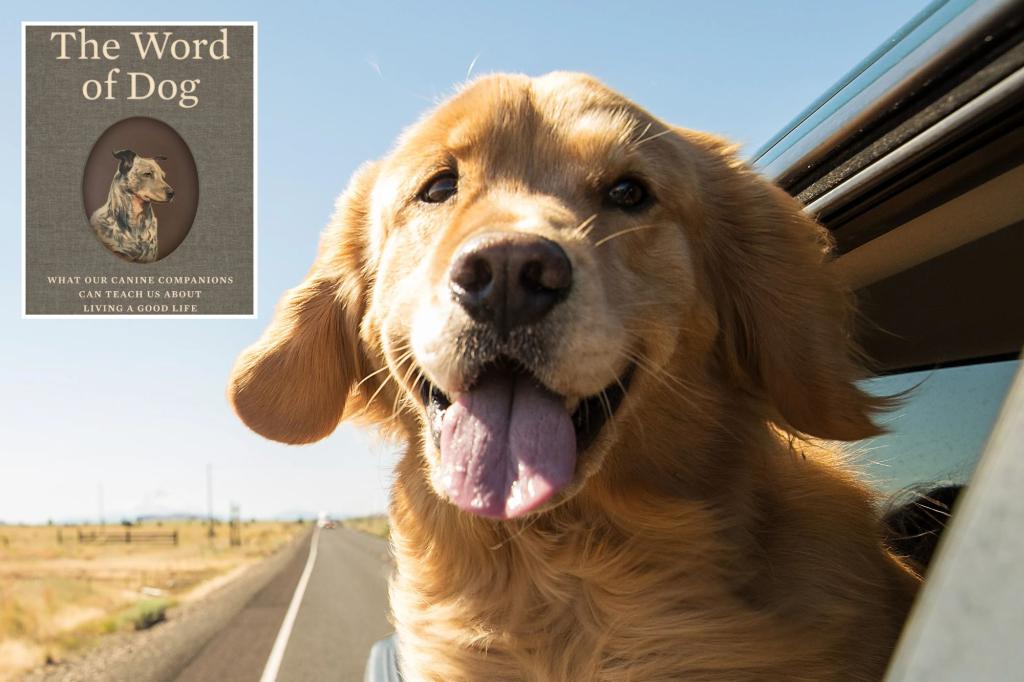
Chew on this: A dog’s life — even if that means joyfully and endlessly chasing squirrels — is more meaningful than a dog owner’s life, asserts Mark Rowlands, professor, and chair of the Department of Philosophy at the University of Miami, in his latest meditation on the inherent happiness of our canine companions.
“A dog loves his life with everything he has because it is all he has,” writes Rowlands, in “The Word of Dog: What Our Canine Companions Can Teach Us About Living a Good Life” (Liveright/Norton).
Rowlands, whose previous book was “The Philosophy of the Wolf,” offers not so much revelations of the inner workings of our faithful companions, but a philosophical message on how we can live a more fulfilling life inspired by the unselfish joy dogs experience — even in repetitive tasks such as chasing a ball.
The lesson to be learned from dogs in the professor’s deep dive is the love of life and the action a dog experiences in his uncomplicated life. According to Rowlands, “Dogs love their lives more than we love ours. That is why their lives are more meaningful than ours.”
It’s clear in this 249-word treatise that one could benefit from a crash course in Philosophy 101 to comprehend some of the author’s thinking. And, fair warning, there are no cuddling puppy tales, or tips on how to interpret answers to typical canine owner’s questions such as whether their dog really loves them, or whether their four-legged companion is really happy.
Instead, Rowlands leans on the deep and dour philosopher Jean-Paul Sartre to answer those questions, and to decipher the unspoken wisdom dogs exhibit.
Rowlands, who himself is a serial dog owner and had for more than a decade actually lived with a wolf, maintains that a dog can experience more joy than a human because man’s best friend is not burdened by what Sartre referred to as “reflective self-awareness,” which the author contends can cripple man.
He proffers that dogs have no capacity for reflection but they do have pre-reflection — knowing they exist relative to other objects in space, blissfully unaware that it may be anything more than a moving ball they are chasing.
Rowlands writes that his “distinctly dangerous” German shepherd, Shadow — whose soaring testosterone bans him from peaceful dog parks — has no awareness of the impact on his environment when he starts fights with every male dog, assaults females, or marks an occupied park bench by urinating on it, thus Shadow’s lack of reflection keeps him out of polite society.
According to the author, Shadow has the ability to experience pleasure in the smallest acts — chasing sunbathing iguanas on the banks of a canal in Miami.
He never catches one but the big dog is willing to repeat the game every morning — the game Rowlands compares to the myth of Sisyphus in Greek mythology who was a devious tyrant punished in his afterlife and condemned to push a boulder up to the top of the hill only for it to endlessly roll back down. Chasing but never catching the iguanas. Rowlands contends, resembles a Sisyphean task, but Shadow plays the game daily with great joy.
“Finding meaning in life is hard for us, but easy for dogs,” maintains Rowland. “The happiness of Shadow is a happiness that originates in and erupts from his deepest nature. Meaning for us is a hard-won achievement, and one rarely attained. Judged in terms of the meaning it contains, Shadow’s life eclipses mine.”
Rowlands contends that dogs are both actors and authors of their lives and not spectators, or critics, unlike humans, who are creatures of reflection and doubt that in time can possibly riddle one with cancer. The author interprets meaning in life as authentic happiness and that the lives of dogs are typically more meaningful and filled with more love than the lives of humans because they are not burdened by reflection and have only one life to live.
While we continually scrutinize and evaluate, Rowlands suggests we have two lives, and “we can never love our two lives with the passion of a dog . . . A dog only has one life, and of it he is actor and not spectator, author and not critic.”
While thinking such as “executing a logical inference,” may be hard for a dog, Rowlands writes that dogs simply look at the right side of the human face which is controlled by the left side of the brain expressing emotions and understanding what is going on.
Rowlands concludes there is more meaning in a dog’s life than man’s because man has been fractured by reflection into two lives of dubious compatibility.
“Meaning in life exists wherever happiness erupts from nature. If you want to know the meaning of life, get a dog,” Rowland concludes, because dogs lead “more meaningful lives than we do . . . Working out why this is so — is what this book is all about.”
This post was originally published on this site be sure to check out more of their content.












































